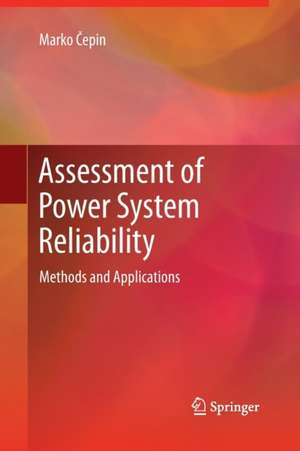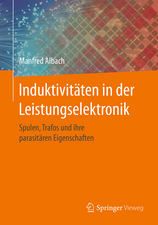Assessment of Power System Reliability: Methods and Applications
Autor Marko Čepinen Limba Engleză Paperback – 19 aug 2014
The objective of Assessment of Power System Reliability is to contribute to the improvement of power system reliability. It consists of six parts divided into twenty chapters. The first part introduces the important background issues that affect power system reliability. The second part presents the reliability methods that are used for analyses of technical systems and processes. The third part discusses power flow analysis methods, because the dynamic aspect of a power system is an important part of related reliability assessments. The fourth part explores various aspects of the reliability assessment of power systems and their parts. The fifth part covers optimization methods. The sixth part looks at the application of reliability and optimization methods.
Assessment of Power System Reliability has been written in straightforward language that continues into the mathematical representation of the methods. Power engineers and developers will appreciate the emphasis on practical usage, while researchers and advanced students will benefit from the simple examples that can facilitate their understanding of the theory behind power system reliability and that outline the procedure for application of the presented methods.
| Toate formatele și edițiile | Preț | Express |
|---|---|---|
| Paperback (1) | 945.79 lei 6-8 săpt. | |
| SPRINGER LONDON – 19 aug 2014 | 945.79 lei 6-8 săpt. | |
| Hardback (1) | 950.52 lei 6-8 săpt. | |
| SPRINGER LONDON – 29 iul 2011 | 950.52 lei 6-8 săpt. |
Preț: 945.79 lei
Preț vechi: 1153.39 lei
-18% Nou
Puncte Express: 1419
Preț estimativ în valută:
180.98€ • 193.53$ • 150.89£
180.98€ • 193.53$ • 150.89£
Carte tipărită la comandă
Livrare economică 18 aprilie-02 mai
Preluare comenzi: 021 569.72.76
Specificații
ISBN-13: 9781447161004
ISBN-10: 1447161009
Pagini: 324
Ilustrații: XXI, 300 p.
Dimensiuni: 155 x 235 x 17 mm
Greutate: 0.45 kg
Ediția:2011
Editura: SPRINGER LONDON
Colecția Springer
Locul publicării:London, United Kingdom
ISBN-10: 1447161009
Pagini: 324
Ilustrații: XXI, 300 p.
Dimensiuni: 155 x 235 x 17 mm
Greutate: 0.45 kg
Ediția:2011
Editura: SPRINGER LONDON
Colecția Springer
Locul publicării:London, United Kingdom
Public țintă
ResearchCuprins
1. Introduction to Power Systems.- 2. Introduction to Blackouts.- 3. Definition of Reliability and Risk.- 4. Probability Theory.- 5. Fault Tree Analysis.- 6. Event Tree Analysis.- 7. Binary Decision Diagram.- 8. Markov Processes.- 9. Reliability Block Diagram.- 10. Common Cause Failures.- 11. Methods for Power Flow Analysis.- 12. Generating Capacity Methods.- 13. Reliability and Performance Indicators of Power Plants.- 14. Distribution and Transmission System Reliability Measures.- 15. Power System Reliability Method.- 16. Linear Programming,- 17. Dynamic Programming.- 18. Genetic Algorithm.- 19. Simulated Annealing.- 20. Application of Reliability and Optimization Methods.
Notă biografică
Marko Čepin is a professor at the Faculty of Electrical Engineering at the University of Ljubljana, Ljubljana, Slovenia. He received his PhD from the same university. Before taking on full-time teaching duties at the University of Ljubljana, he was a researcher at the Jožef Stefan Institute. His research interests are related to the Department for Power Systems and Devices, where his work focuses on the development and application of safety and reliability methods with emphasis on energy and the environment.
Textul de pe ultima copertă
The importance of power system reliability is demonstrated when our electricity supply is disrupted, whether it decreases the comfort of our free time at home or causes the shutdown of our companies and results in huge economic deficits.
The objective of Assessment of Power System Reliability is to contribute to the improvement of power system reliability. It consists of six parts divided into twenty chapters. The first part introduces the important background issues that affect power system reliability. The second part presents the reliability methods that are used for analyses of technical systems and processes. The third part discusses power flow analysis methods, because the dynamic aspect of a power system is an important part of related reliability assessments. The fourth part explores various aspects of the reliability assessment of power systems and their parts. The fifth part covers optimization methods. The sixth part looks at the application of reliability and optimization methods.
Assessment of Power System Reliability has been written in straightforward language that continues into the mathematical representation of the methods. Power engineers and developers will appreciate the emphasis on practical usage, while researchers and advanced students will benefit from the simple examples that can facilitate their understanding of the theory behind power system reliability and that outline the procedure for application of the presented methods.
The objective of Assessment of Power System Reliability is to contribute to the improvement of power system reliability. It consists of six parts divided into twenty chapters. The first part introduces the important background issues that affect power system reliability. The second part presents the reliability methods that are used for analyses of technical systems and processes. The third part discusses power flow analysis methods, because the dynamic aspect of a power system is an important part of related reliability assessments. The fourth part explores various aspects of the reliability assessment of power systems and their parts. The fifth part covers optimization methods. The sixth part looks at the application of reliability and optimization methods.
Assessment of Power System Reliability has been written in straightforward language that continues into the mathematical representation of the methods. Power engineers and developers will appreciate the emphasis on practical usage, while researchers and advanced students will benefit from the simple examples that can facilitate their understanding of the theory behind power system reliability and that outline the procedure for application of the presented methods.
Caracteristici
Provides varied examples for both novice and advanced practitioners Features tables of sample data that enable traceability of the given results Written in straightforward language
















